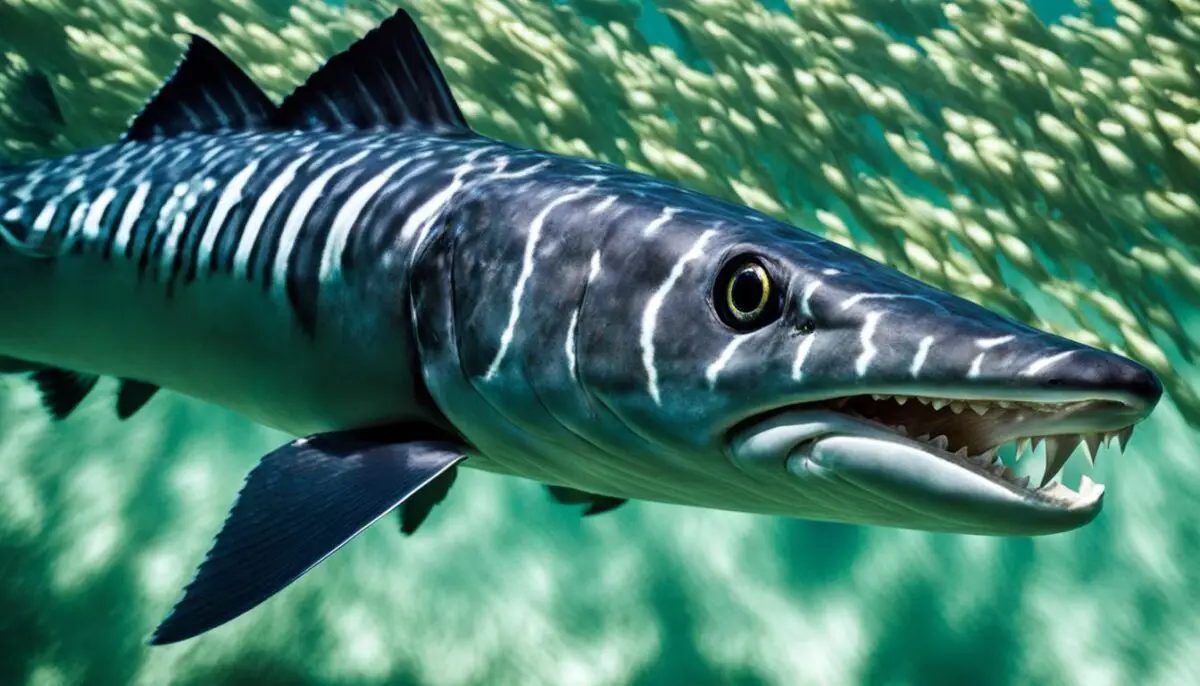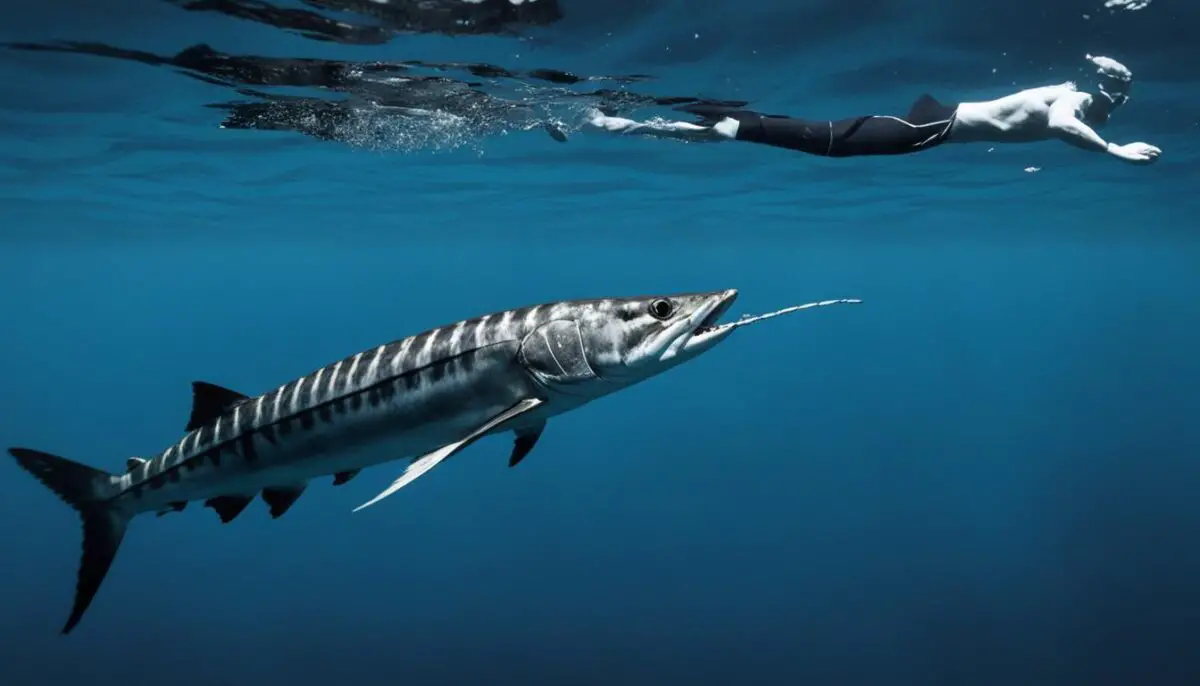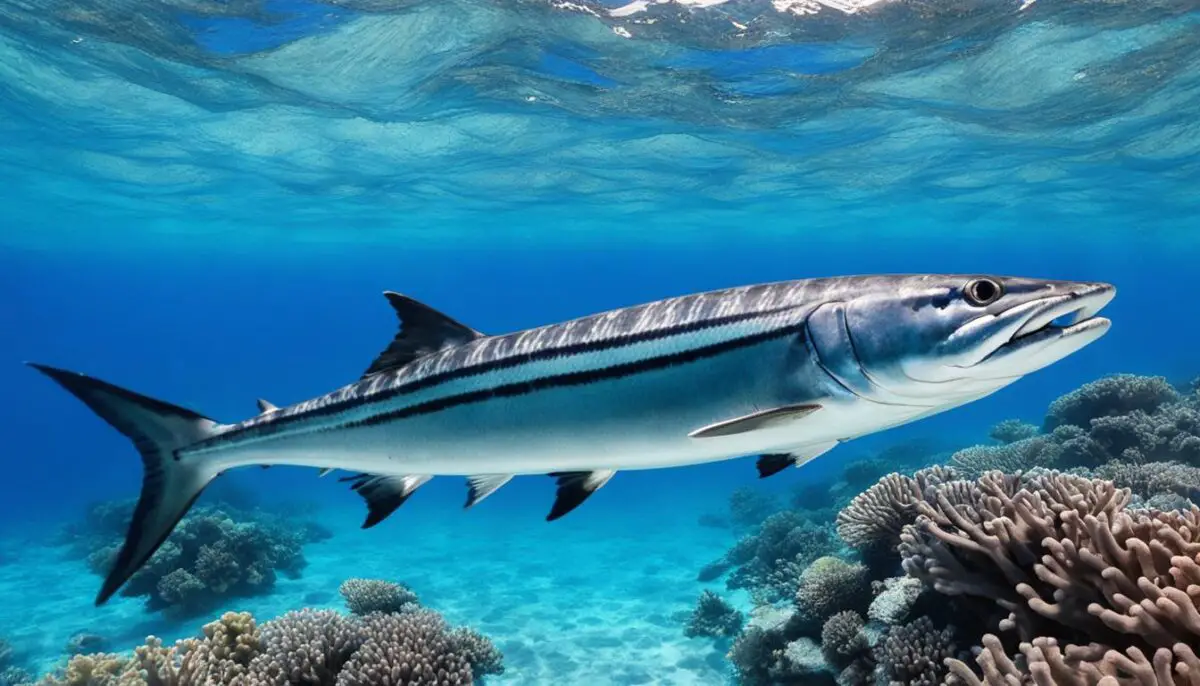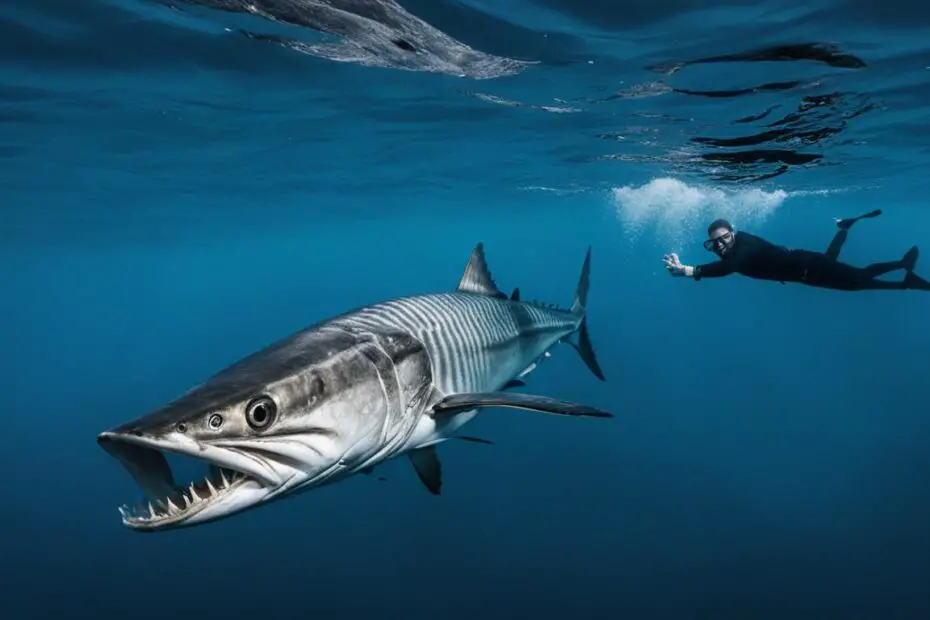Barracudas are fascinating creatures that inhabit various marine environments. While barracuda attacks on humans are rare, it is important to be aware of the potential risks and take appropriate precautions when swimming or diving in areas where barracudas are present.
Although uncommon, barracuda attacks on humans do occur. These attacks are often cases of mistaken identity, as barracudas may confuse swimmers or divers for prey. It is crucial to understand the behavior of barracudas and know how to prevent and respond to potential encounters.
In this article, we will delve into the anatomy and behavior of barracudas, assess the risks associated with barracuda-human encounters, provide safety tips for interacting with barracudas, discuss the differences between barracudas and sharks, explore barracuda conservation efforts, and share first aid tips for barracuda bites.
To ensure your safety and enhance your understanding of these magnificent creatures, keep reading for valuable information and actionable tips.
Key Takeaways:
- Barracuda attacks on humans are uncommon but can result in serious injuries.
- Barracudas may mistake swimmers or divers for prey due to their keen eyesight.
- Understanding barracuda behavior and following safety guidelines can help minimize the risk of attacks.
- Compared to sharks, barracudas are typically smaller and less aggressive towards humans.
- Ciguatera poisoning is a significant threat to barracudas, highlighting the importance of sustainable fishing practices.
Understanding Barracudas: Anatomy and Behavior
Barracudas, belonging to the Sphyraenidae family, are known for their distinctive anatomy and fascinating behavior. Let’s delve deeper into what makes these predatory fish unique.
Anatomy
Barracudas have elongated, cylindrical bodies that are built for speed and agility. Their torpedo-shaped structure enables them to swiftly navigate through the water, reaching speeds of up to 35 mph. These sleek predators possess a set of razor-sharp teeth, perfectly designed for capturing and tearing apart their prey.

Behavior
Barracudas are opportunistic hunters, employing various strategies to secure their meals. With their exceptional eyesight, they are capable of spotting their prey from a distance, even in murky waters. Once their target is in sight, barracudas employ lightning-fast bursts of speed to ambush and capture smaller fish, squid, and crustaceans.
“Barracudas rely on their keen senses to navigate their surroundings, locate prey, and execute swift attacks.”
Despite their hunting prowess, barracudas are typically not aggressive towards humans. However, it’s important to remember that their natural instincts and sharp teeth can make them potentially dangerous in certain situations.
Hunting Strategies
Barracudas utilize a range of hunting techniques to secure their next meal. Their favorite hunting strategies include:
- Ambushing: Barracudas patiently lie in wait, hidden among coral reefs or seagrass beds, and then launch surprise attacks on unsuspecting prey.
- Chasing: These skilled hunters often engage in high-speed chases, tirelessly pursuing their prey until they successfully capture it.
- Group Hunting: In some cases, barracudas work together, forming hunting packs to increase their chances of securing a meal.
By employing these cunning hunting strategies, barracudas demonstrate their adaptability and effectiveness as predators in various aquatic environments.
Prey
The barracuda diet mainly consists of smaller fish, such as anchovies, herrings, and mullets. They also prey upon squid and crustaceans. Barracudas are known for their voracious appetites, consuming prey that may even be half their own size!
Senses
Barracudas rely on their acute senses to navigate their surroundings and detect prey. Their excellent eyesight enables them to spot fast-moving targets, while their lateral line system helps them detect vibrations and changes in water pressure. These sensory adaptations make barracudas formidable hunters in their aquatic habitats.
By understanding the anatomy and behavior of barracudas, we gain a greater appreciation for their place in the marine ecosystem. It is crucial to respect their natural instincts and exercise caution when encountering these fascinating creatures in their native habitat.
Assessing the Risks: Barracudas and Human Encounters
Barracuda attacks on humans are not a common occurrence, but when they do happen, they are often the result of mistaken identity or provoked self-defense. These sleek predators may mistake swimmers or divers for prey due to their exceptional eyesight. The sharp teeth and powerful jaws of barracudas can cause serious harm when they bite a person.
It’s important to note that not all barracudas pose a threat to humans, and their behavior can vary. Several factors can influence the likelihood of an attack. The clarity of the water, the presence of other prey, and the temperament of individual barracudas all play a role in determining their aggression towards humans.
When barracudas feel threatened or intimidated, they may exhibit aggressive behavior. This could happen if a swimmer or diver approaches them too closely or invades their territory. While barracudas are generally not aggressive towards humans, it is essential to exercise caution and respect their space to minimize the risk of an attack.
“Not all barracudas pose a threat to humans, and their behavior can vary. Factors such as water clarity, presence of other prey, and individual barracuda temperament can influence the likelihood of an attack.”
To understand the risk of barracuda attacks on humans, it is crucial to consider the factors mentioned above. Being aware of one’s surroundings, staying vigilant, and understanding barracuda behavior can help avoid potential encounters and ensure the safety of both humans and barracudas in their shared aquatic environments.

Preventing Barracuda Attacks: Safety Measures
To minimize the risk of barracuda attacks, it is essential to follow these safety measures:
- Avoid making sudden, rapid movements or splashing in the water, as this can trigger barracuda’s predatory instincts.
- Avoid wearing shiny jewelry or accessories that may resemble barracuda prey.
- Maintain a safe distance from barracudas, especially if they are feeding or hunting.
- If you want to observe barracudas, do so from a distance without approaching or provoking them.
- If you feel uneasy or unsafe around a barracuda, calmly and promptly exit the water.
By following these safety measures, it is possible to coexist with barracudas in their natural habitat while reducing the risks associated with human encounters.
Safety Tips for Barracuda Interactions
To enjoy a safe swimming or diving experience around barracudas, it is important to follow these essential safety tips:
- Avoid rapid movements or splashing in the water, as this can trigger the predatory instincts of barracudas.
- Refrain from wearing shiny jewelry or accessories that may resemble prey to barracudas.
- Maintain a safe distance from barracudas, especially if they are feeding or hunting.
- If you want to observe barracudas, do so from a respectful distance without approaching or provoking them.
- If you feel uneasy or unsafe around a barracuda, calmly and promptly exit the water.
By following these safety tips, you can minimize the risk of barracuda attacks and ensure a safe and enjoyable experience in their presence.

Expert Tip:
“When swimming with barracudas, it is crucial to be mindful of their predatory nature. Avoid erratic movements, maintain a safe distance, and respect their habitat. If you encounter a barracuda, stay calm and observe from afar. Remember, their curiosity is harmless as long as you respect their personal space.”
| Barracuda Interaction Tips | Preventing Barracuda Attacks | Staying Safe Around Barracudas |
|---|---|---|
| Avoid rapid movements or splashing | Refrain from wearing shiny jewelry | Maintain a safe distance |
| Observe from a respectful distance | Exit calmly if feeling unsafe |
Barracudas vs. Sharks: Understanding the Differences
When comparing barracudas and sharks, it is important to note that both species have the potential to exhibit aggression towards humans. However, their behavior and level of danger can vary significantly.
Barracudas, although formidable predators, are not typically as large or powerful as sharks. As a result, their attacks on humans are relatively rare. Barracudas are known for their swift swimming and sharp teeth, but their interactions with humans are more often cases of mistaken identity or provoked self-defense.
On the other hand, sharks have a notorious reputation for being more aggressive towards humans. It is essential to recognize that certain shark species, such as the great white shark or tiger shark, may pose a higher risk to humans due to their size and predatory nature.
Both barracudas and sharks should be approached with caution, as they are wild animals with natural hunting instincts. However, the level of threat they pose may differ. Barracudas are generally not regarded as highly dangerous to humans, while certain sharks are known for their potential to engage in fatal attacks.
Comparing Barracudas and Sharks
- Barracudas: Relatively smaller and less powerful than sharks.
- Barracuda Attacks on Humans: Relatively rare and often cases of mistaken identity or self-defense.
- Sharks: Larger and more powerful predators compared to barracudas.
- Shark Attacks on Humans: Can be more frequent and potentially more dangerous than barracuda attacks.
It is crucial to understand that both barracudas and sharks play vital roles in marine ecosystems. They are essential for maintaining balanced food chains and biodiversity. Respect for these animals’ habitats and adherence to proper safety guidelines can help ensure peaceful coexistence between humans and these fascinating creatures.

Barracuda Conservation and Threats
Barracudas are magnificent creatures that play an essential role in marine ecosystems. While they are not currently listed as endangered or vulnerable by the International Union for Conservation of Nature (IUCN), there are concerns about their future due to various threats they face in their natural habitats.
“Barracudas are vital for maintaining the balance and health of coral reefs and other coastal ecosystems. Protecting their populations is crucial for the overall well-being of marine environments.”
One significant threat to barracudas is ciguatera poisoning, a type of foodborne illness that can affect humans who consume barracuda meat contaminated with ciguatoxins. Ciguatera poisoning can result in symptoms such as nausea, vomiting, gastrointestinal issues, and neurological effects. It is a serious concern both for human health and the well-being of barracuda populations.
The conservation of barracudas requires efforts to mitigate these threats and promote responsible practices, including sustainable fishing methods and responsible consumption. By implementing fishing regulations and promoting awareness about ciguatera poisoning, we can safeguard barracuda populations and ensure their long-term survival.
Protecting Barracuda Populations: Actions to Take
To protect barracudas and contribute to their conservation, here are the actions we can take:
- Practice sustainable fishing: Support sustainable fishing practices that minimize the impact on barracuda populations and their habitats. This includes adhering to fishing regulations, limiting catch, and avoiding destructive fishing methods.
- Education and awareness: Increase public awareness about the importance of barracudas in marine ecosystems and the threats they face. Promote responsible consumption of barracuda meat and educate individuals about the risks of ciguatera poisoning.
- Marine protected areas: Advocate for the establishment and proper management of marine protected areas to provide safe habitats for barracudas and other marine species.
- Research and monitoring: Support scientific research and monitoring initiatives to gather data on barracuda populations, their behavior, and the impact of threats. This knowledge can guide targeted conservation efforts.
By taking these actions collectively, we can contribute to the conservation of barracudas and protect these incredible creatures for future generations to admire and appreciate.
First Aid for Barracuda Bites
In the rare event of a barracuda bite, it is crucial to respond quickly and seek medical help. The following first aid steps should be taken:
-
Get the victim out of the water to prevent further injury.
-
Clean the wound with soap and water to remove dirt or debris.
-
Apply pressure to stop any bleeding.
-
Check for broken barracuda teeth in the wound and remove them if possible.
-
Disinfect the wound with an antiseptic solution.
-
Cover the wound with a sterile bandage.
-
Seek medical attention for further evaluation, treatment, and prevention of infection.
| First Aid Steps for Barracuda Bites |
|---|
| 1. Get the victim out of the water. |
| 2. Clean the wound with soap and water. |
| 3. Apply pressure to stop bleeding. |
| 4. Check for broken barracuda teeth and remove them. |
| 5. Disinfect the wound with an antiseptic. |
| 6. Cover the wound with a sterile bandage. |
| 7. Seek medical attention for evaluation and treatment. |
Conclusion
While barracuda attacks on humans are rare, it is essential to be aware of the potential risks and take appropriate precautions when swimming or diving in areas where barracudas are present. Understanding barracuda behavior, following safety guidelines, and knowing how to respond in the event of an attack can help ensure a safe and enjoyable aquatic experience for everyone.
FAQ
Will barracudas attack humans?
Barracuda attacks on humans, although uncommon, do occur. These attacks are often cases of mistaken identity, as barracudas may confuse swimmers or divers for prey. While not typically aggressive towards humans, barracudas can be dangerous if they bite. It is important to exercise caution and follow safety tips in waters where barracudas are present.
How dangerous are barracudas to humans?
Barracudas can be potentially dangerous in certain circumstances. Their sharp teeth and hunting instincts make them a threat if they mistake humans for prey or feel threatened. However, not all barracudas pose a threat to humans, and their behavior can vary.
How can I prevent barracuda attacks?
To minimize the risk of a barracuda attack, it is important to follow safety tips such as avoiding rapid movements or splashing in the water, refraining from wearing shiny jewelry or accessories that may resemble prey, maintaining a safe distance from barracudas, and observing them from a distance without approaching or provoking them. If you feel unsafe around a barracuda, calmly exit the water.
How do barracudas behave towards humans?
Barracudas may mistake swimmers or divers for prey due to their keen eyesight. In some instances, they may feel threatened or intimidated, leading to aggressive behavior. However, not all barracudas pose a threat to humans, and their behavior can vary depending on factors such as water clarity, presence of other prey, and individual temperament.
How do barracudas compare to sharks in terms of aggression towards humans?
Both barracudas and sharks can exhibit aggression towards humans, but their behavior and level of danger can vary. Barracudas are generally smaller and less powerful than sharks, and attacks on humans by barracudas are relatively rare. Sharks, on the other hand, have a reputation for being more aggressive, and certain species may pose a higher risk to humans.
Are barracudas endangered?
Barracudas are not currently listed as endangered or vulnerable by the IUCN. However, there are concerns about their future due to threats such as ciguatera poisoning, which can occur when humans consume contaminated barracuda meat. Sustainable fishing practices and responsible consumption are important for protecting barracuda populations.
What should I do in the event of a barracuda bite?
In the rare event of a barracuda bite, it is crucial to respond quickly and seek medical help. Get the victim out of the water, clean the wound with soap and water, apply pressure to stop bleeding, check for broken barracuda teeth in the wound and remove them if possible, disinfect the wound with an antiseptic solution, cover the wound with a sterile bandage, and seek medical attention for further evaluation and treatment.

